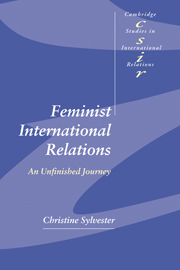Book contents
- Frontmatter
- Contents
- Acknowledgments
- Part I Introduction
- 1 Looking backwards and forwards at International Relations around feminism
- 2 Introducing Elshtain, Enloe, and Tickner: looking at key feminist efforts before journeying on
- Part II Sightings
- Part III Sitings
- Part IV Citings
- References
- Index
- CAMBRIDGE STUDIES IN INTERNATIONAL RELATIONS
1 - Looking backwards and forwards at International Relations around feminism
Published online by Cambridge University Press: 22 September 2009
- Frontmatter
- Contents
- Acknowledgments
- Part I Introduction
- 1 Looking backwards and forwards at International Relations around feminism
- 2 Introducing Elshtain, Enloe, and Tickner: looking at key feminist efforts before journeying on
- Part II Sightings
- Part III Sitings
- Part IV Citings
- References
- Index
- CAMBRIDGE STUDIES IN INTERNATIONAL RELATIONS
Summary
For the academic field of International Relations (IR), the decade of the 1980s effectively opened with Hedley Bull's The Anarchical Society: A Study of Order in World Politics (1977) and/or with Kenneth Waltz's neorealist Theory of International Politics (1979) – depending on one's geographical and philosophical site in the field. The decade closed on a note that opened all of IR to radical departures from the general tenor (and tenure) of the Bull and Waltz tomes: it closed with Cynthia Enloe's Bananas, Beaches, and Bases: Making Feminist Sense of International Relations (1989). Elements of the new colors and tones washing into the field had been foreshadowed two years earlier in Jean Bethke Elshtain's Women and War (1987). The feminists were not the only challengers about (e.g., Ashley and Walker, 1990a; Der Derian and Shapiro, 1989), but they would turn into one of the most sustaining groups at IR's timbered doors.
Bull had presented the realist case for basing IR on the notion of an international society of sovereign states through which order is maintained and justice struggled over in world politics (see also Bull and Watson, 1986). Waltz had re-sited classical realist theory beyond the realm of states and society; he wrote about the systemic ordering principle of anarchy in international relations and its necessary spawns-rationality and self-help.
- Type
- Chapter
- Information
- Feminist International RelationsAn Unfinished Journey, pp. 3 - 17Publisher: Cambridge University PressPrint publication year: 2001



